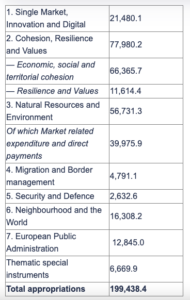The Commission has recently welcomed an agreement between the European Parliament and the European Council on the annual EU budget 2025. This budget will allow the EU to deliver on its political commitments, starting with the changes agreed in the mid-term revision of the Multiannual Financial Framework (MFF). The annual EU Budget for 2025 will amount to €199.4 billion.
The annual EU budget 2025 will provide the financial means to power the EU’s political priorities and address urgent crises domestically – starting with facilitating support for the recent floods affecting several Member States – and beyond. It will continue to finance flagship programmes such as Horizon Europe and Erasmus+.
This is on top of the revision of the ceilings of the MFF agreed earlier this year, for the first time ever. The revised MFF provides strong and predictable support to Ukraine, reinforced financing to support European competitiveness through Strategic Technologies for Europe Platform (STEP), address the consequences of the crisis in the Middle East and migratory pressures.
The annual EU budget for 2025 allocates the following amounts to the various EU priorities (in commitments):

- A more detailed overview is featured in the “Questions & Answers” document.
Next steps
The annual budget for 2025 should now be formally adopted by the Council of the European Union and by the European Parliament. The vote in plenary, which will mark the end of the process, is currently scheduled for 27 November 2024.
Background
The annual EU budget for 2025 includes the expenditure covered by the appropriations under the long-term budget ceilings, financed from own resources. These are topped up by expenditure under NextGenerationEU, financed from borrowing on the capital markets. Two amounts for each programme are proposed in the draft budget – commitments and payments. “Commitments” refer to the funding that can be agreed in contracts in a given year; and “payments” to the money actually paid out. All amounts are in current prices.






